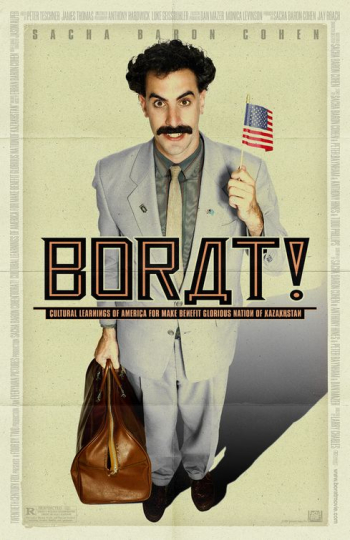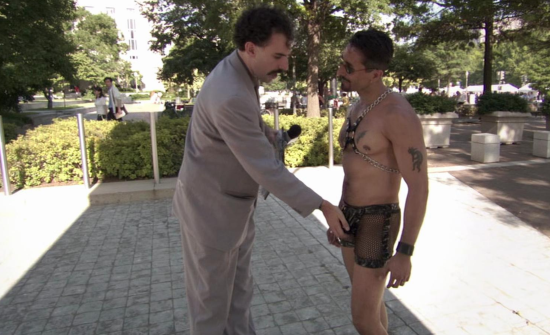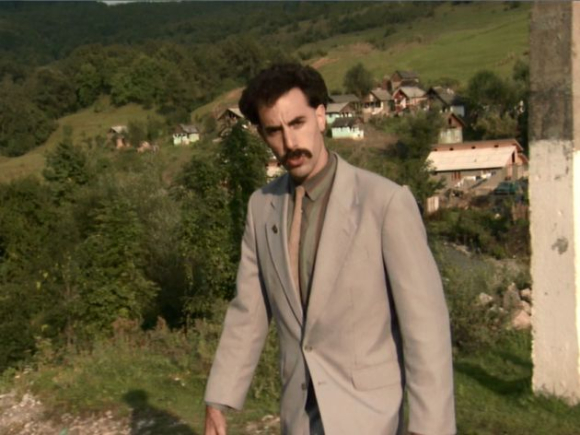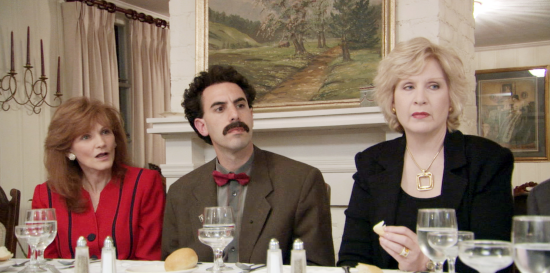Welcome!
Groupthink doesn't live here, critical thought does.
Get cool rewards when you click on the button to pledge your support through .
Thanks a lot acorns!
Your kind generosity keeps the reviews coming!
Bawdy, quick-witted, and unrelentingly hilarious, "Borat" is possibly the funniest movie ever made. Television’s "Da Ali G Show" mastermind Sacha "Baron" Cohen plays the Kazakh character Borat Sagdiyev, which Cohen developed during the run of his cable television program, to impossibly hilarious heights in a comedy that combines all facets of postmodern cinematic satire.
This film-within-a-film finds Borat, “the second most successful reporter in all Kazakhstan,” leaving his native third-world village of Kuczek to make a documentary about America, a magical place that he can only barely begin to comprehend.
Upon arriving at his hotel in Manhattan, Borat discovers the erotic phenomenon of CJ (Pamela Anderson) while watching an episode of "Baywatch," and resolves to travel to California with his documentary producer Azamat (Ken Davitian) in order to marry her. Along the way, Borat takes his reporting duties seriously interviewing members of a feminist group, political yahoo Alan Keyes, a humor coach, and a Southern etiquette mentor, in a random effort at uncovering American conventions to pass along to the Kazakh public through Kazakhstan’s “Ministry of Information.”
"I like a you; I like sex. It’s nice."
It’s with these few provocative words that Baron Cohen grabs his audience by their guts and pulls them into his primitive yet sophisticated formula for mocking everything from racism and hypocrisy to the disparity of wealth and the narcotic effects of pop culture.
The first overtly outrageous episode comes after Borat explains that although Kazakhstan is a glorious country, its three main problems are "economic, social, and Jew." Borat reports on his country’s annual event "the Running of the Jews," wherein boys dressed in white with colored sashes around their waists run from giant paper mache monster heads of a Jewish husband and wife. The surprising punchline comes when the female figure stops in the middle of the road to lay a giant egg, which the local boys viciously kick apart.
Cohen, who is himself Jewish, goes on to roast anti-Semitism later in the film when Borat and Azamat seek shelter at a Southern bed and breakfast hotel unexpectedly operated by an elderly Jewish couple. In order to escape the hotel, Borat throws money at a couple of potato bugs on his room’s floor that he believes represent the shrunken embodiments of the hotel’s owners. The absurdist humor is all the more funny for the film’s distinctly low fidelity visual effects that include a couple of garden variety insects.
The memorable character Borat represents an upwardly mobile Third World peasant closely in touch with the intimate inner workings of culture, all culture. His is an uninhibited curiosity shared by Charlie Chaplin’s unforgettable characters that inevitably locate precise nerves of social oppression to hammer away at. The people that refuse to accept the joke unwittingly conspire to conceal a secret that Baron Cohen already knows; ridicule is the most powerful, or at least accessible, weapon of the oppressed.












